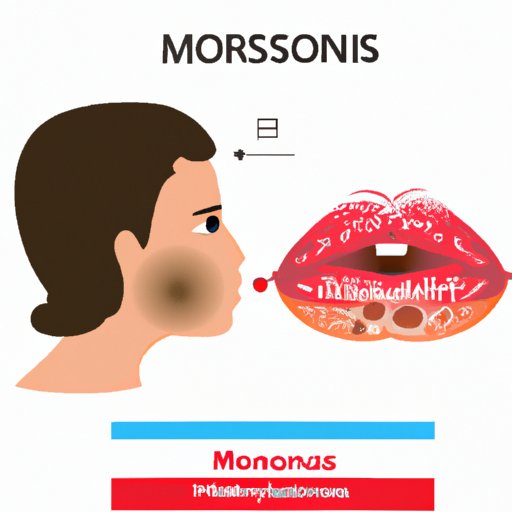
I. Introduction
Mononucleosis, also known as “mono” or the “kissing disease,” is a common viral illness that usually affects teenagers and young adults. This illness is caused by the Epstein-Barr virus (EBV) and can be spread through close contact with an infected person, such as kissing or sharing utensils. Knowing whether or not you have mono is important, as it can help you take the necessary steps to recover and prevent spreading it to others. In this article, we will guide you through the symptoms, diagnosis, and treatment of mono.
II. Symptoms of Mono: What to Look Out For
The symptoms of mono usually appear within four to six weeks after you have been infected with the virus. The most common symptoms of mono include:
- Fatigue
- Sore throat
- Fever
- Swollen lymph nodes
- Headaches
- Muscle aches
- Loss of appetite
It is important to note that not everyone infected with the virus will display all of these symptoms, and some people may not experience any symptoms at all. Additionally, the severity of symptoms can vary from person to person.
Recognizing the symptoms of mono early on is crucial in preventing further complications. If you suspect that you or someone you know may have mono, it is important to seek medical attention immediately.
III. The Importance of a Proper Mono Diagnosis
Seeking a proper diagnosis for mono is important to ensure that you receive the appropriate care and treatment. Mono can often be mistaken for other illnesses, such as strep throat or the flu, as the symptoms can be similar. However, a proper diagnosis will help you understand your condition and how to manage it.
Your healthcare provider may perform a physical exam and several tests to determine whether or not you have mono. These tests may include a complete blood count, a monospot test, or a viral capsid antigen test. A correct diagnosis can help you prevent complications and manage your symptoms more effectively.
IV. How Mono Affects Your Body and Health
While mono is generally not dangerous, it can have a significant impact on your physical and emotional health. Fatigue and weakness are common symptoms of mono and can last for several weeks or even months. Additionally, mono can weaken the immune system and lead to other infections, such as strep throat or sinusitis.
In rare cases, mono can cause more serious complications, such as a ruptured spleen or liver inflammation. These complications can be life-threatening, so it is important to take care of yourself if you are diagnosed with mono.
V. Mono or Just a Cold? Understanding the Differences
Mono may be mistaken for a common cold due to the similarities in symptoms, such as fever and sore throat. However, there are some key differences between the two illnesses. The symptoms of mono usually last longer and are more severe than those of a common cold. In addition, mono is less likely to produce nasal congestion and coughing than a cold.
If you suspect that you have mono, it is important to seek medical attention to obtain a correct diagnosis. Your healthcare provider will be able to rule out other illnesses and provide you with the proper care and treatment.
VI. Quick Mono Diagnosis: Self-Examination and Tests
You can perform a self-examination to help determine if you have mono. Look out for the most common symptoms, such as fatigue, sore throat, and swollen lymph nodes. If you have several of these symptoms, you should seek medical attention immediately.
Your healthcare provider may also perform several tests, such as a blood test or a monospot test, to diagnose mono. These tests will help determine if your symptoms are caused by the Epstein-Barr virus.
VII. Mono Treatment: What You Need to Know
There is no cure for mono, and treatment is focused on managing the symptoms and preventing complications. Your healthcare provider may recommend rest, plenty of fluids, and over-the-counter pain relievers to manage the symptoms of mono.
In some cases, your healthcare provider may recommend antiviral medications to reduce the duration and severity of your symptoms. These medications work best when taken early on in the infection.
It is important to note that antibiotics are not effective against viral infections like mono. If you are diagnosed with mono, avoid antibiotics unless you have a bacterial complication, such as strep throat.
VIII. Living with Mono: Tips, Advice, and Coping Strategies
Living with mono can be challenging, especially when dealing with the physical and emotional symptoms. Here are some tips and strategies to help you cope with the impact of mono:
- Get plenty of rest and sleep
- Drink plenty of fluids
- Eat a healthy and balanced diet
- Avoid strenuous activities and exercise
- Take over-the-counter pain relievers to manage symptoms
- Seek emotional support from loved ones or a mental health professional
If you are diagnosed with mono, it is important to take care of yourself and rest as much as possible. Avoid close contact with others, such as kissing or sharing utensils, to prevent spreading the infection.
IX. Conclusion
Knowing whether or not you have mono is important to help you receive the appropriate care and treatment. In this article, we covered the symptoms, diagnosis, and treatment of mono, as well as tips and strategies for coping with the illness. If you suspect that you have mono, seek medical attention immediately to obtain an accurate diagnosis. Remember, taking care of yourself is crucial in the recovery process.





